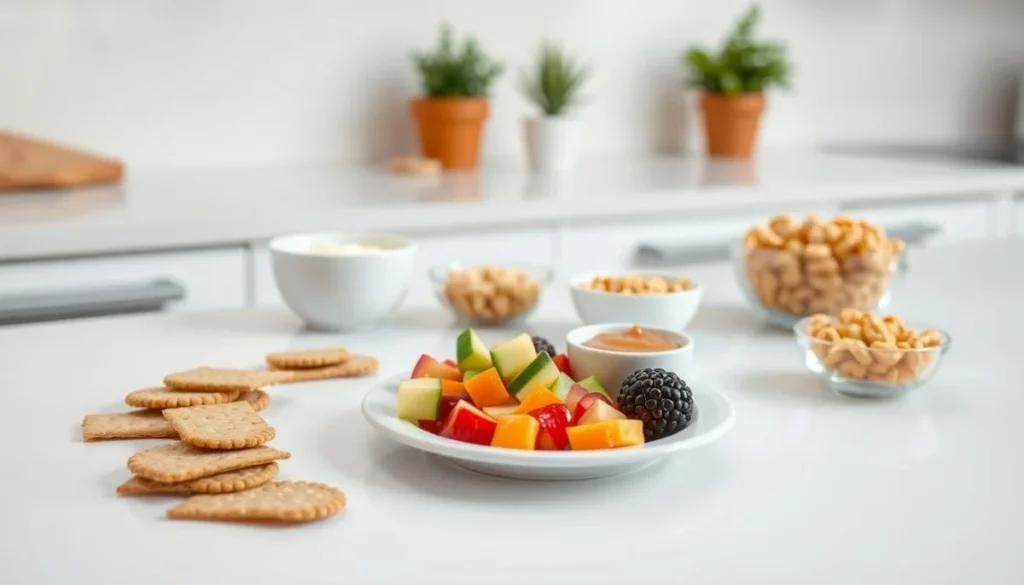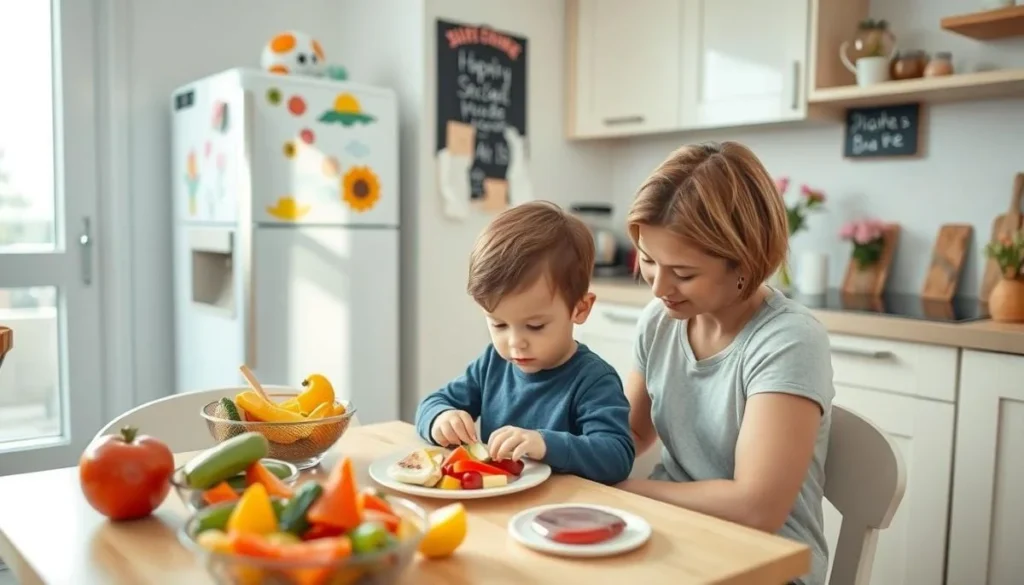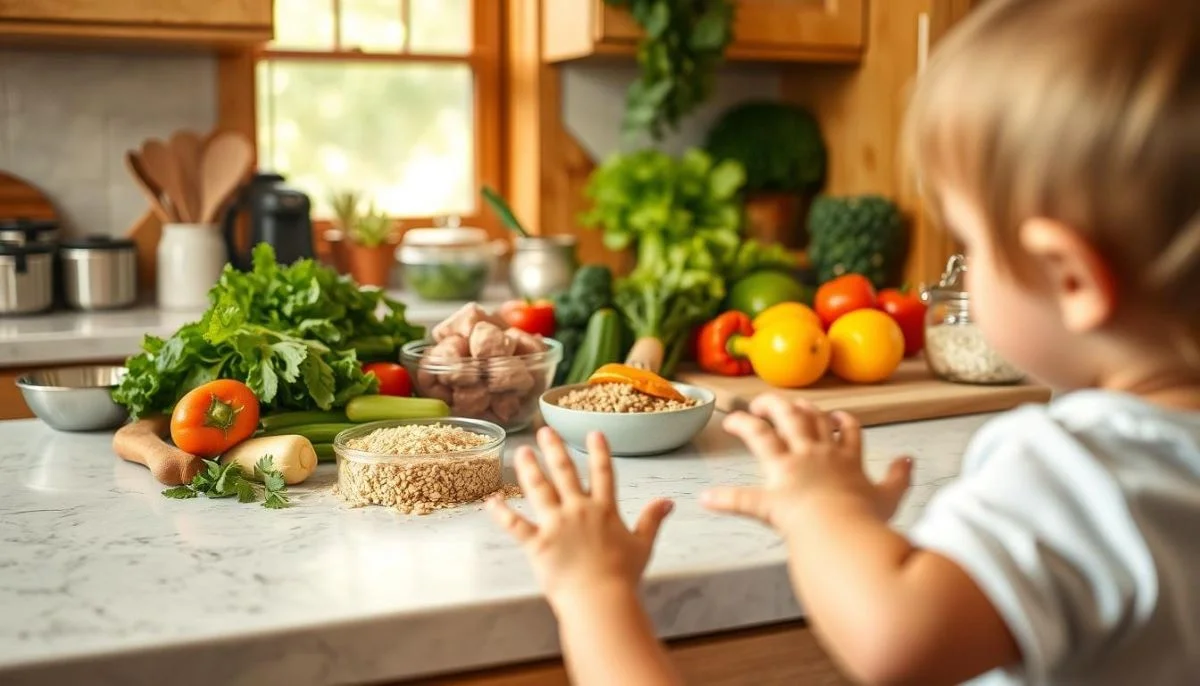5-Minute Toddler Meals: Healthy & Satisfying Recipes
Parenting is full of challenges, and preparing toddler meals can be tough. Every parent struggles to make healthy meals for toddlers while doing other things. But, there’s good news: quick, healthy recipes for kids are easy to find.
Toddlers need to eat often, usually every 2-3 hours. These small meals help them grow fast. With 50 easy meal ideas, you can make mealtime fun and stress-free.
Our recipes focus on child nutrition and are easy to make. You’ll find options like nut butter sandwiches and cheese quesadillas. These meals are quick to prepare and ensure your toddler gets the nutrients they need.
Try recipes like 15-minute Lo Mein or simple burrito bowls. They’re made to please your toddler’s taste. Get ready to find tasty and healthy meal solutions.
Understanding Your Toddler’s Nutritional Needs
Managing your toddler’s diet can be tough. Their food choices are vital for their growth and health. Knowing what and how much to feed them is crucial for their development.
Toddlers need a special diet that’s different from babies and older kids. Their small bodies need lots of nutrients to grow fast.
Essential Nutrients for Growing Toddlers
Here are the key nutrients your toddler needs:
- Protein for muscle growth
- Calcium for strong bones
- Iron for brain function
- Vitamin D for immune health
- Healthy fats for brain growth
Recommended Portion Sizes
Toddler portions are smaller than you might think. A 2-year-old needs about 1,000 to 1,400 calories a day, based on how active they are.
| Food Group | Daily Serving |
|---|---|
| Dairy | 2 – 2½ cups |
| Grains | 2 – 3 servings |
| Fruits | 1 cup |
| Vegetables | 1 cup |
| Protein | 1½ – 2 ounces |
Balancing Macronutrients
Making balanced meals means mixing proteins, carbs, and healthy fats. Think of each meal as a nutritional puzzle where every piece helps your toddler grow.
“Nutrition in the early years sets the foundation for lifelong health.” – Pediatric Nutrition Expert
By knowing about child nutrition and managing portion sizes, you can help your toddler grow well.
Quick and Easy Breakfast Ideas for Busy Mornings
Mornings with toddlers can feel like a whirlwind. Making nutritious meals doesn’t have to be hard or take a lot of time. Our breakfast tips are quick and easy, making delicious meals for your little one.
Start your morning with these fast, healthy breakfast ideas. They’re ready in less than 5 minutes. Focus on meals that are balanced and keep your toddler full and happy.
- Mini Egg Muffins: Packed with protein and easy to make ahead
- Overnight Oats: Prepare the night before for instant morning nutrition
- Smoothie Bowls: Colorful and nutrient-dense healthy snacks
Frozen fruits and pre-chopped ingredients are lifesavers for busy parents. Pro tip: Batch prepare egg muffins on weekends and freeze for quick weekday breakfasts. These make-ahead meals make mornings easier and less stressful.
Your toddler’s breakfast should have different food groups. Try to include:
- Protein (eggs, yogurt, cheese)
- Complex carbohydrates (whole grain toast, oatmeal)
- Fruits or vegetables
- Healthy fats (nut butters, avocado)
It’s important to mix things up to keep meals exciting and healthy. Try different textures and flavors to see what your child likes best.
Simple Toddler Meals for Lunch Success
Lunchtime can be tough for parents looking for healthy and tasty meals for toddlers. It’s important to be creative and plan well. Your child needs food that’s both filling and full of nutrients.

Protein-Rich Options
Protein is vital for your toddler’s growth. Here are some high-protein lunch ideas:
- Mini turkey meatballs
- Cheese quesadillas
- Hummus wraps
- Greek yogurt with fruit
Make sure your toddler’s lunch has a protein source. This helps them stay full and energetic.
Colorful Veggie Combinations
It’s important to make veggies fun for your toddler. Try these colorful veggie mixes:
- Carrot sticks with ranch dip
- Cucumber rounds with cream cheese
- Bell pepper strips
- Roasted sweet potato cubes
Fun Finger Foods
Finger foods are great for toddlers learning to eat on their own. They make lunch fun and easy to handle:
- Sandwich pinwheels
- Mini frittatas
- Homemade chicken nuggets
- Zucchini slice
| Lunch Component | Recommended Quantity |
|---|---|
| Protein | ¼ cup |
| Whole Wheat Crackers | ½ cup |
| Fresh Vegetables | ¼ cup |
| Fresh Fruit | ½ cup |
Use insulated lunch bags with ice packs to keep food fresh. Variety is the key to keeping toddler meals interesting and nutritious!
Kid-Friendly Snack Solutions
Snacking is key for your toddler’s nutrition. They have small tummies and lots of energy. So, they need snacks that are full of nutrients and keep them full between meals. It’s important to find snacks that are balanced and tasty for picky eaters.
“Every bite counts” – Dietary Guidelines for Americans
When planning snacks, aim for a mix of food groups and nutrients. Include proteins, healthy fats, and complex carbs. These help your child grow and develop well.
- Nutrient-rich snack ideas for toddlers:
- Avocado toast with soft cheese
- Greek yogurt with chia seeds
- Homemade fruit and veggie smoothies
- Mini whole-grain quesadillas
- Cucumber sticks with hummus
When making snacks, safety is top priority. Cut foods into small pieces to avoid choking. Cut whole fruits lengthwise and cut round foods like grapes into quarters.
| Snack Type | Nutritional Benefits | Preparation Time |
|---|---|---|
| Yogurt Smoothie | Protein, Calcium, Omega-3 | 5 minutes |
| Fruit Kebabs | Vitamins, Fiber | 10 minutes |
| Veggie Sticks | Minerals, Low Calories | 3 minutes |
Pro tip: Involve your toddler in snack preparation to make mealtime more engaging and encourage healthy eating habits.
Toddlers need about two snacks a day. Pick snacks that are good for them and fun to eat. This helps with their growth and dealing with picky eating.
Time-Saving Dinner Recipes for Toddlers
Dinner time can be tough for busy parents. They want meals that both toddlers and adults will like. The right meal planning can make dinner time better and healthier for everyone.
Quick and tasty meals are easy to make. We’ve found dinner ideas that save time but still keep everyone healthy.
Sheet Pan Meals: Minimal Effort, Maximum Flavor
Sheet pan meals are a big help for families on the go. They are:
- Ready in 5 minutes
- Easy to clean up
- Good for your health
- Flexible with ingredients
One-Pot Wonders for Stress-Free Cooking
These convenient one-pot recipes make meal planning easier. They include stews and pasta dishes that are quick and nutritious.
Quick Assembly Dinners for Hectic Evenings
When time is short, these fast dinner ideas are lifesavers. Try these tips:
- Have breakfast for dinner
- Have taco nights where everyone can make their own
- Make simple stir-fries
- Use hidden veggies in pasta sauces
With these toddler meals, dinner can be easy and fun for everyone.
Strategies for Dealing with Picky Eaters

Dealing with picky eaters can be tough for parents. Mealtime often turns into a battle of wills. But, knowing about child nutrition can make meals better.
Picky eating starts around 15-18 months. Up to 50% of toddlers go through this phase. It can be hard for even the most patient parents.
“The key is persistence, not pressure,” says pediatric nutritionists.
- Offer new foods repeatedly (up to 15 times)
- Involve children in meal preparation
- Create visually appealing plates
- Model good eating habits
Here are some strategies for dealing with picky eaters:
| Strategy | Benefit |
|---|---|
| Family Meals | Encourages children to try new foods |
| No Food Negotiations | Prevents creating negative food associations |
| Consistent Exposure | Increases likelihood of food acceptance |
Remember, most children outgrow picky eating by school age. Stay patient and positive during this developmental phase.
Make meals fun by cutting foods into shapes. Avoid stress during meals. Kids who help cook are more likely to eat what they make.
Smart Meal Planning Tips for Parents
Planning meals for toddlers can seem daunting. But, with smart planning, you can turn kitchen chaos into calm. It’s not just about food. It’s about setting up routines that feed your family well.
For toddlers, meal planning means saving time and cutting down on stress. Here are some tips to make lunchbox ideas and daily meals easier.
Weekly Prep Ideas
- Batch cook proteins like chicken and ground turkey
- Chop vegetables in advance
- Prepare grains like quinoa and rice in bulk
- Create portion-controlled containers for quick assembly
Storage Solutions
Boost your meal planning with smart storage. Use clear, stackable containers for prepped ingredients. Store items for 3-4 days in the fridge and freeze the rest for later.
Time Management Tricks
- Plan meals on weekends
- Use a shared digital calendar for meal tracking
- Involve toddlers in simple prep tasks
- Create a rotating menu to reduce decision fatigue
Pro tip: Flexibility is crucial in meal planning. Don’t aim for perfection—aim for progress!
Healthy Ingredient Swaps and Substitutions
Turning toddler meals into nutritional powerhouses is easy. You don’t need to be a master chef. Just make smart swaps to boost nutrition and keep meals tasty.
Here are some tips to make your toddler’s meals healthier:
- Replace butter with applesauce or mashed bananas in baking
- Swap salt for herbs and spices to enhance flavor naturally
- Use Greek yogurt instead of sour cream or mayonnaise
- Substitute ground meat with mashed beans for protein variety
Healthy snacks can also get a makeover. Try baked veggie chips for less fat than regular chips. Top whole grain cereal with fresh fruit for vitamins and minerals without too much sugar.
When cooking for toddlers, aim for meals that are both healthy and fun. Use zucchini noodles, baked chicken nuggets, and fruit desserts. These changes can turn regular meals into exciting, nutritious adventures for your child.
Creativity in the kitchen is key to making healthy eating enjoyable for toddlers!
Making Mealtimes Fun and Educational
Turning toddler meals into fun learning experiences can make eating exciting. By making mealtime positive and interactive, you help your child develop good food habits. This supports their nutrition journey.
Using meals as learning chances helps fight picky eating. Kids learn best by doing things themselves. So, mealtime is a great place for them to learn about nutrition.
Interactive Eating Activities
- Create a rainbow eating challenge where kids try foods of different colors
- Use fun-shaped utensils to make meals more exciting
- Let toddlers help with simple meal preparation tasks
- Play counting games with food items
Teaching Food Groups
Teaching about food groups can be fun for your toddler. Use pictures, stories, and fun demos to teach them about nutrition.
- Use colorful food group charts
- Create simple matching games
- Discuss where different foods come from
Creating Positive Experiences
It’s important to make mealtime relaxed and free from stress. Celebrate small wins and let them explore food without forcing them to eat.
- Avoid using food as a reward or punishment
- Model positive eating behaviors
- Offer choices within healthy options
- Keep mealtimes short and engaging (10-15 minutes)
Remember, the goal is to make toddler meals enjoyable and educational, turning each bite into a learning opportunity.
Get picks related to the current post:
- Quick & Easy Dinners for 1 Year Old Toddlers
- Tasty Meals Toddlers and Preschoolers Love to Eat
- Healthy Meal Ideas for 14 Month Old | Toddler Nutrition
- Healthy Meals for 1 Year Old: Complete Feeding Guide
Conclusion
Preparing meals for toddlers can change how we think about child nutrition. This guide offers strategies and recipes to make meal planning fun for parents. It helps support your toddler’s growth and makes mealtime enjoyable.
Every child is different, so meal planning needs patience and creativity. Being flexible and trying new things with meals is key. This approach helps your child try new foods and develops healthy eating habits.
Sticking to balanced, tasty meals will benefit your child in the long run. You can try simple quesadillas, deconstructed tacos, and zucchini noodles to keep things interesting. Enjoy the journey of feeding your toddler, as each meal helps them grow and builds a positive food relationship.
You can about Baby-led weaning by visiting this link.
FAQ
How many calories does a toddler need daily?
What are the best protein sources for toddlers?
How can I get my picky eater to try new foods?
Are smoothies a good meal option for toddlers?
How much fruits and vegetables should a toddler eat daily?
What are some quick breakfast ideas for busy mornings?
How can I make meals more appealing to my toddler?
Are snacks important for toddlers?
How can I ensure my toddler gets enough calcium?
What are some strategies for meal planning with a toddler?
How did you find our Post?
There are no reviews yet. Be the first one to write one.

